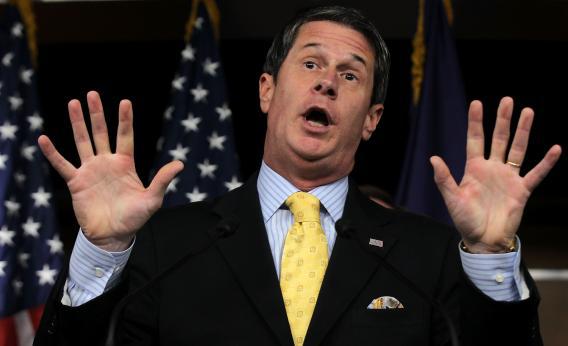The best hope for boosting economic growth and reducing unemployment is expansionary monetary policy. And there’s been considerable speculation that Federal Reserve Chairman Ben Bernanke is being restrained in his ability to engage in monetary expansion by other members of the Federal Reserve Open Market Committee, especially the regional Federal Reserve Bank Presidents. The good news is that there are two open seats on the Federal Reserve Board of Governors and the board members get automatic seats on the Open Market Committee. So in principle by filling those seats with two people who are equally committed to monetary expansion as Bernanke—or even better, people who are more committed—the White House and the Senate could provide a powerful boost to economic growth.
But Sen. David Vitter, R-La., doesn’t want that to happen, and has placed a hold on Obama’s two nominees saying: “I refuse to provide Chairman Bernanke with two more rubber stamps who approve of the Fed’s activist policies.”
Vitter, in other words, likes the jobless rate right where it is or perhaps wishes it were even higher. By adopting less “activist” policies, the Fed could push nominal spending levels even further below trend than they currently are. And with nominal spending lower, more people would lose their jobs. With more people unemployed, there’d be fewer people commuting to work and fewer people renting apartments. The key housing and energy segments of the Consumer Price Index would fall and Vitter and other monetary hawks could declare mission accomplished on price stability. Ethically and economically, I think that would be a disaster, but to Vitter’s credit he’s being admirably clear about what his beef with Jeremy Stein and Jerome Powell is. There’s no trumped-up charges here and no nonsense. Vitter believes that adding Stein and Powell to the Fed Board would increase aggregate demand, and he doesn’t want to see that happen. In the modern day U.S. Senate, a handful of senators with strong feelings about an issue can basically block an appointee and Vitter has strong feelings about the desirability of a lower level of demand.
Now given that everyone agrees that the Fed plays an important role in job growth and that job growth plays an important role in a president’s re-election prospects, we might ask ourselves what the endgame of this is. Presumably, the out-of-power party should (strategically speaking) always push for tighter money and slower job growth in order to defeat the incumbent president and the rules of the Senate give them powerful tools to do it.
Conversely, the conventional wisdom is still paying much too little attention to this issue. The neglect of the Federal Reserve Board question by the Obama White House and the Senate Democrats throughout 2009 was little commented upon at the time (though I commented on it) but in retrospect turns out to have been by far their biggest mistake. My general view of things is that Team Obama made a radically smaller number of policy errors than most critics (whether of the conservative, liberal, or centrist ilk) seem to think, but that some of those errors were extremely costly. This is one of them and the downstream consequences of failing to get a board solidly in favor of expansion and full employment have been massive. Note, however, that if Senate Republicans want to do the country a favor and insist on filling the vacancies with candidates solidly in favor of expansion and full employment they have the option of doing so at any time. Instead, Vitter has taken the lead on this issue complaining that the existing Fed has engaged in too much “activism” in pursuit of curbing joblessness.
